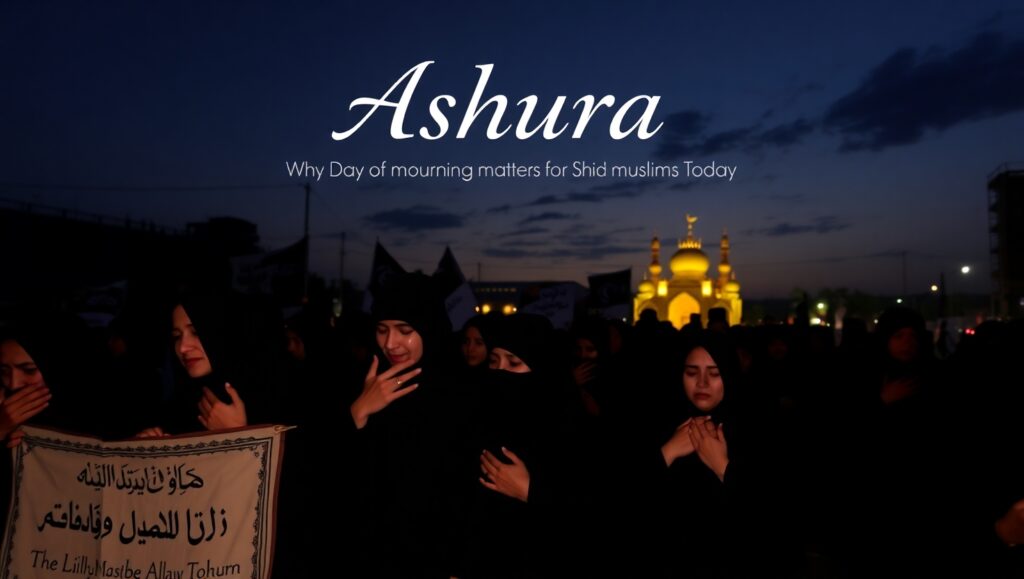Introduction
The plains of Karbala in present-day Iraq are more than a historical site—they are a sacred symbol of resistance, sacrifice, and unwavering faith. For Shia Muslims and many others, Karbala is etched deeply in the spiritual and emotional consciousness, commemorated with tears, mourning, and remembrance. At the center of this profound legacy stands Imam Hussain ibn Ali (AS), the beloved grandson of Prophet Muhammad (PBUH), who took a principled stand against tyranny and injustice.
Imam Hussain’s martyrdom during the Battle of Karbala on the 10th of Muharram in 61 AH (680 CE) is not merely a tragic episode in Islamic history; it is a timeless call to uphold truth, dignity, and faith. This article explores the historical context of Karbala, its spiritual and cultural significance in Shia Islam, and how its message continues to resonate globally.
Karbala: The Eternal Stand for Justice and Faith
Historical Background of Karbala
The Battle of Karbala occurred in a politically volatile era. Following the death of Imam Ali (AS) and later Imam Hasan (AS), the Umayyad dynasty, led by Yazid ibn Muawiya, assumed power. Yazid’s leadership, marked by moral corruption and political manipulation, stood in stark contrast to Islamic principles. When Yazid demanded allegiance from Imam Hussain (AS), the Imam refused, asserting that a corrupt ruler could not represent Islam.
Imam Hussain, along with his family and a small group of companions—totaling around 72—journeyed toward Kufa in response to support from its people. However, Yazid’s forces intercepted them at Karbala. Surrounded and denied access to water, the Imam and his followers endured unimaginable suffering. On Ashura, the 10th of Muharram, Imam Hussain and most of his companions, including his six-month-old son Ali Asghar, were brutally martyred.
This battle was not one of military might but of moral and spiritual defiance. It was Imam Hussain’s message to the world: never compromise truth and justice, no matter the cost.
The Spiritual Significance of Karbala in Shia Islam
The martyrdom of Imam Hussain is the cornerstone of Shia theology and collective identity. His sacrifice is viewed as an ultimate act of devotion to God and humanity. Shia Muslims see Karbala as a divine testing ground where truth triumphed over tyranny through unparalleled courage and spiritual resilience.
Karbala is more than an event—it is a philosophy of resistance against oppression. Imam Hussain’s stance is echoed in the values of selflessness, justice, and ethical leadership. His words, “I only desire to spread good values and prevent corruption in the nation of my grandfather,” remain a guiding light for those seeking moral integrity.
The themes of divine love, loyalty, and unwavering faith are deeply embedded in the Karbala narrative. Shia scholars often highlight the metaphysical dimensions of Karbala, where Imam Hussain becomes a spiritual archetype for the believer who refuses to bow before falsehood, regardless of worldly loss.
Shia Rituals and Practices Connected to Karbala
The legacy of Karbala is kept alive through deeply emotive rituals that allow Shia Muslims to express grief, solidarity, and spiritual commitment. The most significant of these are the commemorations of Ashura and Arbaeen.
Ashura, the day of Imam Hussain’s martyrdom, is marked with mourning processions, public recitations of elegies (marsiyas), and lamentation poetry (nohas). Majalis, or mourning gatherings, are held to narrate the tragedy of Karbala and reflect upon its moral lessons. Latmiyah, rhythmic chest-beating in unison, is practiced as an emotional release and communal act of grief.
On Arbaeen, the 40th day after Ashura, millions undertake a pilgrimage to Karbala—the Arbaeen walk—making it one of the world’s largest peaceful human gatherings. This symbolic journey reflects a personal and collective renewal of allegiance to Imam Hussain’s cause.
While some rituals like Zanjeer Zani (symbolic self-flagellation) and Taziya processions are practiced by certain communities, they are approached with cultural sensitivity and spiritual reflection, emphasizing the pain and sacrifice endured by the family of the Prophet.
Karbala in Modern Times: Global Relevance
The universal values represented by Karbala—justice, resistance to tyranny, and spiritual integrity—resonate far beyond the 7th-century battlefield. In modern times, these values inspire social justice movements, interfaith dialogues, and humanitarian efforts.
Imam Hussain’s stand is frequently cited in global discussions around moral leadership and ethical resistance. His courage is seen as a timeless template for confronting injustice, not through violence, but through principled action and faith-driven conviction.
The Arbaeen pilgrimage continues to grow in global recognition, drawing millions of participants from across continents. Social media platforms and digital storytelling have played a crucial role in spreading the message of Karbala, allowing new generations to engage with its lessons and reflect on its relevance in their lives.
Imam Hussain’s Legacy in Shia Beliefs
To Shia Muslims, Imam Hussain is not just a martyr—he is the savior of Islam. His refusal to legitimize a corrupt regime preserved the ethical foundations of the faith. His legacy informs every aspect of Shia spiritual and moral outlook.
Shia teachings emphasize that faith must be paired with action. Imam Hussain exemplified this by choosing death over dishonor, teaching that Islam is not merely a set of rituals but a comprehensive moral framework. Quotes attributed to him, such as, “Death with dignity is better than a life of humiliation,” are frequently cited as spiritual maxims.
His legacy lives in the hearts of believers through education, poetry, prayer, and activism. Shia centers of learning often dedicate entire semesters to studying the principles embodied in Karbala, and many Shia youth movements adopt Imam Hussain as a model for ethical engagement in society.


